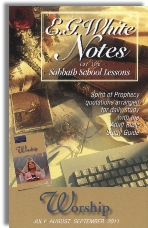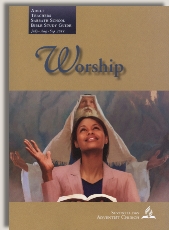|
||||||||||||||
Commentary on "Trust Not in Deceptive Words": The Prophets and Worship
Day 6: Thursday, August 25, 2011 - "This Is the Temple of the Lord, the Temple of the Lord. . . ."
Overview
On the next-to-the-last lesson the author once more introduces the theme which constituted the week's subject. This time he appeals to a well-known chapter from Jeremiah in which the people appealed to the temple as a guarantee of God's blessings for them despite their disobedience and unfaithfulness toward Him. Their mantra, "This is the temple of the Lord, the temple of the Lord, the temple of the Lord," is deceptive because they assumed that their right worship at the right place was everything that was required.
Observations
This approach to the problem is flawed because it doesn't take into consideration the fact that they assumed wrongfully that the temple was an unconditional promise of God's favor. In reality, the Mosaic covenant stated that the possession of the land of Canaan was conditional upon people's fulfilling the stipulations of the covenant. This covenant, which was a covenant based on law, attached blessings to obedience and curses to disobedience. While the blessings were related to living a long life in the land (see the fifth commandment from the Decalogue), the curses constituted the opposite—loss of the land and living in exile, outside the Promised Land. The prophet Daniel acknowledged that his exile in Babylon was God's covenant curse on Israel (Daniel 9:10,11) for failing to obey the covenant requirements. In Jeremiah, God corrects the error of the people who thought that the temple was the sure proof of God's unconditional blessing, that their tenure in the land depended on their moral behavior:
"If you really change your ways and your actions and deal with each other justly, if you do not oppress the foreigner, the fatherless or the widow and do not shed innocent blood in this place, and if you do not follow other gods to your own harm, then I will let you live in this place, in the land I gave your ancestors for ever and ever" (Jer. 7:5-7).
Despite God's intervention, the people didn't learn the lesson and lost the land.
The application to todayis a little bit difficult because in the new covenant, the principles of inheritance are different than in the old covenant. It is true that God still requires obedience, but now the obedience is no longer the condition of inheritance. In the old covenant people lost the blessings, lost the inheritance they received from their ancestors, lost the land because they were disobedient, unfaithful. But in the new covenant, failing to be faithful doesn't result in losing eternal life.
"If we are faithless, He remains faithful, for He cannot deny Himself" (2 Timothy 2:13).
Christ obtained for us an eternal redemption (Hebrews 9:12). In Jesus Christ all God's promises are "yes", not yes or no, as in the old covenant, depending on people's faithfulness (2 Cor. 1:20). From this perspective, applying an old covenant lesson to a new covenant people is not a proper application. Of course, from the Adventist perspective, the application is natural because, despite claims to the contrary, Adventists look at the new covenant through old covenant eyes. To God's unconditional, "Yes" promises in Christ, fulfilled in His life, death and resurrection that forever made atonement for sin and removed any ground for condemnation, Adventists attach the conditional "ifs" of the old covenant, transforming them into "yes" and "no" promises.
Eternal life through Christ? Yes, but no if you're not obedient. Complete atonement? Yes, but no if you're not sanctified enough. Sealing? Yes, but no if you're not successfully pass the test of the Sunday law. For every blessing there is a "Yes", but there is also a "No, if you're unfaithful". Is our justification grounded solely in Christ's righteousness imputed to us? Yes, but no if .... (fill in the blanks). Unfortunately, the lesson that Adventists desperately need to learn is that, as it happened with Israel, the conditional element is fatal for those involved in an Old Covenant type of covenant, Israel went into exile and never truly recovered afterward, they remained in exile even in their land, under occupation.
Ellen White wrote in Steps to Christ, chapter 7: "Our only ground of hope is in the righteousness of Christ imputed to us, and in that wrought by His Spirit working in and through us."
Israel's failure shows that our only ground of hope is in the righteousness of Christ imputed to us, period. As Martin Luther said, "We are all beggars". God justifies the ungodly. The most adequate prayer for our situation is "God, have mercy on me, the sinner."
Copyright 2011 BibleStudiesForAdventists.com. All rights reserved. Revised August 24, 2011. This website is published by Life Assurance Ministries, Glendale, Arizona, USA, the publisher of Proclamation! Magazine. Contact email: BibleStudiesForAdventists@gmail.com.
The Sabbath School Bible Study Guide and the corresponding E.G. White Notes are published by Pacific Press Publishing Association, which is owned and operated by the Seventh-day Adventist church. The current quarter's editions are pictured above.
Official Adventist Resources
Standard Edition Study Guide Week 9
Teacher's Edition Study Guide Week 9
Easy Reading Edition Study Guide Wk 9
Search the Complete Published Ellen G. White Writings
Please Support This Project


